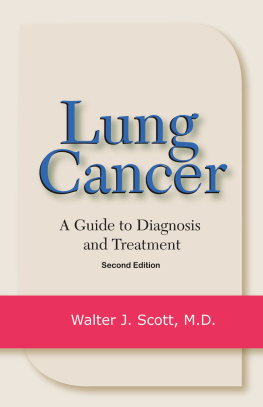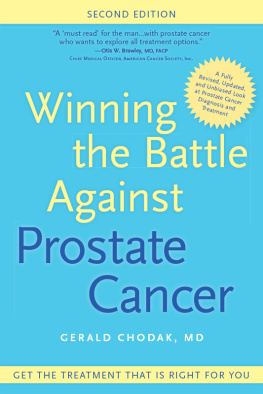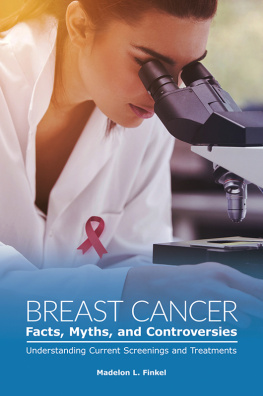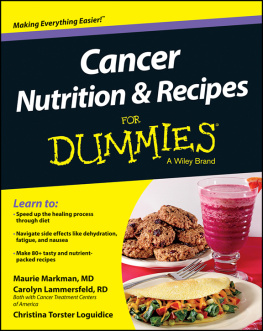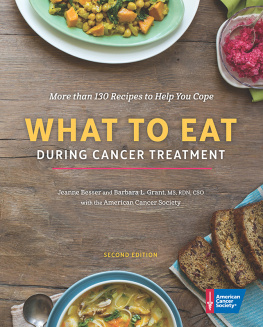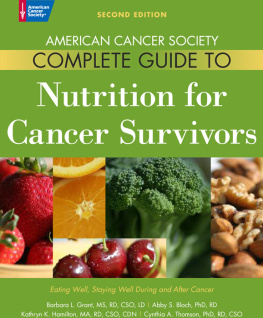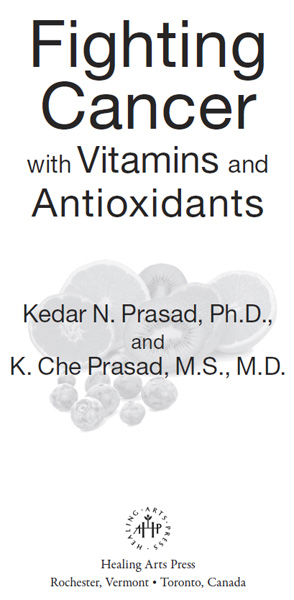
Foreword
Much has been achieved during the past fifty years in relation to the prevention and early detection of several cancers. For example, most lung cancers would not occur if nobody smoked, and many early and therefore curable breast cancers can now be detected by mammography, or early and eminently curable large-bowel cancers detected by colonoscopy. Similarly, advances in cancer treatment have resulted in the prolonged survival or even the cure of many whose outlook was previously regarded as poor.
In spite of all this progress there are still many hurdles to jump in the successful prevention and treatment of many cancers. This is where Fighting Cancer with Vitamins and Antioxidants comes into the picture. The authors, a father-son duo of published scientists, lucidly describe the evidence and potential value of vitamins and several other micronutrient supplements in both the prevention and treatment of cancer.
A major feature of this book is the clarity with which complex concepts, such as the immune system, antioxidants, free radicals, how supplements work, and carcinogens in our environment, lifestyle, and diet are explained. These concepts and terms are often quoted in popular literature without explanation, leaving many, especially lay readers, in the dark.
Important to the authors approach is a reliance on scientific data and rational evidence. They emphasize the major distinction between the preventive and therapeutic approach to micronutrient use. They also believe that micronutrient supplements, used alone, are not a cure-all or panacea, but rather adjuncts to other strategies, such as diet in cancer prevention, and surgery, radiotherapy, or chemotherapy in cancer treatment. The misuse and risks of inappropriate micronutrient use are outlined in the book. The authors stress using supplements in conjunction with the advice of a physician or other relevant health professional, a policy I strongly support.
In cancer prevention, the authors propose a strategy that combines the avoidance of exposure to environmental carcinogens such as smoking with a healthy diet and lifestyle changes including regular exercise and the daily use of multiple micronutrients, the nature and dosage of which is based on currently available data.
Author Kedar N. Prasad is also an expert and published radiobiologist. Because of this expertise he has included an interesting and novel section on cancer risk after diagnostic doses of radiation, a relatively poorly researched field, especially when it comes to cancer prevention. In cancer prevention of this group of people, the authors propose the addition of antioxidants to currently practiced strategies of radiation dose reduction. The authors also mention the potential value of antioxidant use among other groups exposed to various forms of radiation, such as pilots, airline stewards, radiation and radiology workers, and even those who use cell phones heavily. Clearly, further research is needed.
The place of micronutrient supplements as an adjunct to radiation, chemotherapy, or experimental treatments such as hyperthermia is the subject of controversy. Many oncologists and physicians believe that antioxidants and perhaps other supplements protect normal cells as well as cancer cells from radiation damage, thereby making such cancer treatment less effective than expected. The authors of this book, however, argue that there is sufficient scientific evidence to show that an appropriately dosed combination of multiple supplements protects normal body cells but not cancer cells, thereby decreasing the adverse side effects of radiation and possibly of chemotherapy. Important clinical research is needed to resolve this controversy, and the authors quite correctly suggest the conducting of well-designed intervention studies with the use of appropriately dosed multiple supplements.
This book is clearly written and based on science and current data. It provides a stimulus for much-needed research in some unresolved areas of cancer prevention and cancer treatment. The book is an important contribution to the prevention and treatment of human cancers, and the role that micronutrient supplements play within it.
GABRIEL KUNE, M.D.,
EMERITUS PROFESSOR OF SURGERY,
THE UNIVERSITY OF MELBOURNE,
AUSTRALIA
PREFACE
Why Should You Read This Book?
Despite extensive research on the role of diet, lifestyle, and antioxidants in cancer prevention, the incidence of cancer in the United States has increased from 1.2 million new cases per year only a decade ago to about 1.5 million cases per year in 2009. The current recommendation of consuming a diet rich in antioxidants, low in fat, and high in fiber, although very rational, has not had significant impact on reducing the incidence of cancer. Increased oxidative stress from the production of excessive amounts of free radicals, along with the effects of chronic inflammation, plays a major role in the initiation and progression of cancer.
Micronutrients, especially antioxidants, have been shown to help ameliorate these effects; therefore, they have great potential for reducing the risk of cancer. Unfortunately, some clinical studies in which a single antioxidant was used in populations at high risk for developing cancer (such as heavy tobacco smokers), revealed an increased cancer risk in the antioxidant-treated group. These results have called into question the potential value of antioxidants in cancer prevention. This revised edition of Fighting Cancer with Vitamins and Antioxidants discusses the questions that have arisen from these studies and proposes solutions. The solutions include changes to the diet and lifestyle together with daily supplementation with a specific multiple-micronutrient preparation containing dietary and endogenous (made by the body) antioxidants for reducing the risk of cancer.
The U.S. mortality rate from cancer has not changed significantly during the past several decades, in spite of extensive research and the development of new treatment methods and drugs. The American Cancer Society estimates that in 1950 the death rate from cancer was about 194 per 100,000. In 2006 this value was 180.7 per 100,000. The effectiveness of standard cancer treatment, which includes radiation therapy, chemotherapy, and surgery, has reached a plateau for many solid tumors. In addition, damage to normal tissue occurs during radiation and chemotherapy. While some therapies have been successfulreducing the risk of recurrence of breast cancer with tamoxifen, for examplethere are often no effective strategies to reduce the risk of recurrence of the other primary tumors or the development of second cancers among cancer survivors. There are also no effective strategies to prolong the survival time of patients who have become unresponsive to all therapies. Supplementation with a multiple-micronutrient preparation has great potential to enhance the effectiveness of standard therapy, reduce the risk of recurrence of primary tumors, reduce the risk of developing new cancer among survivors, and increase survival time.
However, the role of antioxidants in cancer therapy has become controversial, and many oncologists discourage patients from taking antioxidants before or after therapy. This revised edition of Fighting Cancer with Vitamins and Antioxidants discusses the reasons behind these controversies and proposes a specific preparation of multiple micronutrients, including antioxidants, for those receiving standard therapy, those in remission, and those who have become unresponsive to all therapies.
Recent studies suggest an increased risk of cancer among individuals who receive diagnostic doses of radiation (such as during mammograms, CT scans, chest X-rays, dental X-rays, and nuclear medicine procedures), radiation workers (individuals working with X-ray equipment and employees at nuclear power plants), and frequent fliers (pilots and crews of aircraft). The revised edition of
Next page

